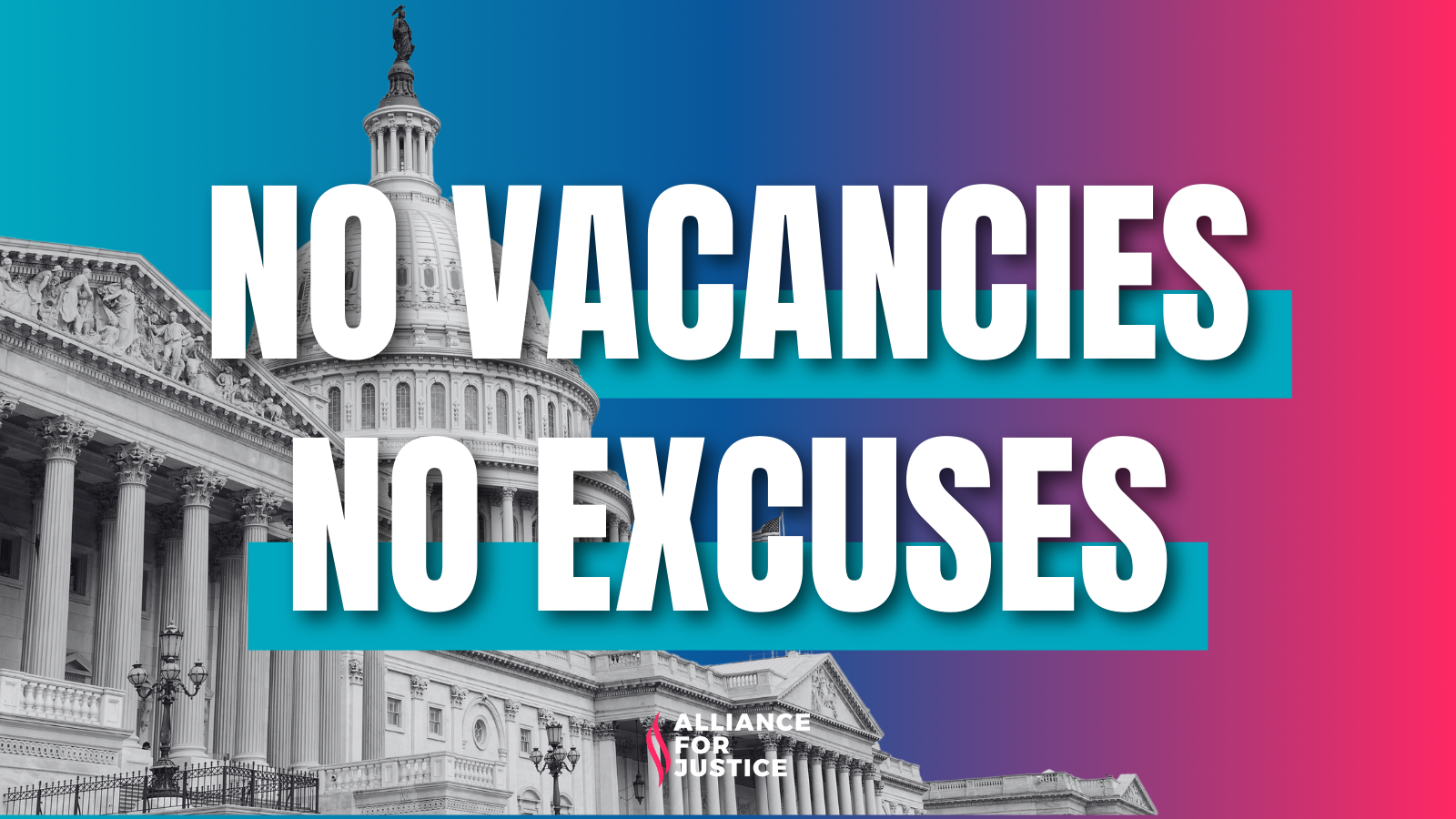Seizing the Moment: No Vacancies, No Excuses
Issues
Executive Power & Civil Liberties, Immigration, LGBTQ+ Americans, Racial Equity
Topics
Community Organizing, Influencing Legislation, Public Charity Advocacy

This week, the Chronicle of Philanthropy came out with an article entitled, “At Some Nonprofits, a Delicate Balance of Grief and Strategy,” which encompasses what many of us in the nonprofit sphere are feeling. You might not be ready for action, and that’s okay. Resting and preparing for the future fight can be a radical act.
For those who have moved through the phases of grief and are ready to start fighting, or ready even amidst your processing, there are critical opportunities right now that could blunt the impact of Trump’s next four years. This moment calls for shoring up our federal judiciary to hold the line on Trump’s promised abuses of power. We have the opportunity to confirm each pending judicial nominee and ensure there is one more judge defending our rights and one less vacancy for Trump to fill.
Until January, the Biden administration and Democratic (51-49) Senate remain in control of the judicial nomination and confirmation process, which doesn’t require House approval to seat new federal judges. They have the power and the responsibility to finish the job of confirming progressive judges and justices. For more on what we can expect from a Trump administration, check out AFJ Justice Program Director Jake Faleschini’s blog post. AFJ’s Judicial Nominee tracker indicates that, at the time of writing, there are 26 pending federal district and circuit court nominees. These include Adeel A. Mangi, nominee to the Third Circuit, who would be the first Muslim American to serve as a federal appellate court judge, and who was nominated over a year ago on November 15, 2023.
This small window until January is when we need to act.
A lame duck is still a duck that can confirm judges.
When you are ready, here are your steps to get moving:
- Do your research. Look into judicial nominees who might impact your communities and your work. Is there a pending nominee for your region? Go check! Take a look at the nominees that AFJ supports and opposes to learn more about the pending nominees and their professional records.
- Refresh yourself on the 501(c)(3) rules. Advocacy on judicial nominations is a great way for a 501(c)(3) to make an impact because federal judicial nominees are nominated by the President and confirmed by the Senate. They are not candidates for public office. That means that advocating for or against a nominee is nonpartisan and does not violate the IRS rules against 501(c)(3) electioneering.
Advocating for votes on judicial nominees usually counts as lobbying and should be tracked against a 501(c)(3) public charity’s lobbying limits. Remember your 501(c)(3) lobbying rules and review our Being a Player guide for information on how to measure your lobbying limits. Be sure to confirm with your team how much lobbying your organization has done this year. If your year ends at the end of the calendar year, this is a great opportunity to use up the remainder of your limit. Alternatively, you could give a grant to a 501(c)(4) affiliate or partner organization up to what is left of your lobbying limit for the year. A 501(c)(4) does not have IRS lobbying limits and can lobby as much as they want — they are a great partner to have for judicial nominee activism.If you are from a private foundation, don’t forget that you can fund charities that are working to influence confirmation votes. Review our foundation resources and remember to avoid earmarking funds for lobbying.
Nonprofits can also educate their networks and the public about nominees without veering into lobbying territory. For example, if you take the 501(h) election, educational social media posts about nominees will not count towards lobbying unless there is a specific call to action. Non-lobbying advocacy is a great use of grant funds that may restrict lobbying activities.
- Talk to your senators and the public. As experts in your subject matter, your knowledge and opinion matter. Directly lobby your senators to get these nominees through the confirmation process before the end of the year. Set up meetings, make calls, and get moving as soon as you can. Let them know that they have more work to do! This is a great opportunity for grassroots lobbying aimed at the public as well: mobilize the people to amplify your impact by creating social media or email campaigns.Emphasize the importance of the judiciary and of these lifetime nominations. Discuss the nominees’ record on issues and experience for the role. Advocate for diverse judges and justices that reflect the communities they serve. With each lifetime appointment confirmed before January, you can make a difference in a district or circuit court for decades to come. Get working to tell the senate: #NoVacanciesNoExcuses!
